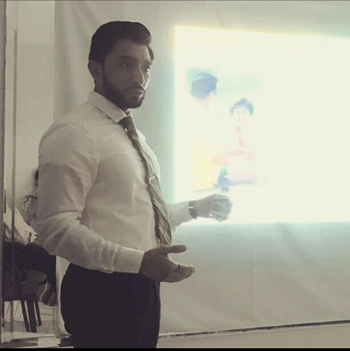
Double Your Impact for the Holidays
Double Your Impact for the Holidays
Your urgently needed year-end gift can go twice as far to provide care and support and accelerate Alzheimer's research this holiday season — and all year long. Show your giving spirit today during this 2x Match Challenge.
Donate NowVolunteer Community Educators Adapt Their Delivery of Alzheimer’s Education During the COVID-19 Pandemic
Dedicated to treating COVID-19 patients as a primary care physician in Mexico, Dr. Claudia Guillen’s ultimate goal is to achieve a medical specialty in Internal Medicine in the United States, where she is currently in the process of revalidating her degree. “During these past three years of my career, I have found a way to support Spanish-speaking people living with Alzheimer’s and their families, especially minorities, patients who are discriminated against due their existing conditions or that have specific escalated needs.
Dr. Guillen is passionate about providing care to those dealing with Alzheimer’s and other dementias, diabetes, hypertension and obesity — diseases that are common in the Hispanic and Latino communities. As she supports her patients and their caregivers in order to improve their overall lifestyle, she looks forward to the day when these diseases can be better controlled.
As a community education volunteer with the Alzheimer’s Association, Dr. Guillen positively affects the lives of more people as a resident near the southern border of California. “Prior to the COVID-19 pandemic, I was providing support at educational fairs, in libraries, at Walk to End Alzheimer’s events and presentations in San Diego, El Centro, Mexicali and Tijuana. Since COVID-19 hit, I have given virtual presentations, both in Spanish or English. During these most unusual of times, I have seen cooperation from caregivers, healthcare workers and volunteers, and great results from the support that we have given each other as a community. Having the opportunity to be a direct communicator of information about Alzheimer's allows me to improve the quality of life of the community at large and meet so many passionate and motivated people through the Alzheimer’s Association, who I consider part of my own family.”
Today, in 2020, as the Hispanic and Latino community faces Alzheimer’s disease amidst a pandemic, there are unique needs that must be met. Dr. Guillen emphasizes seeing a doctor if families notice changes in their loved ones with Alzheimer’s or other dementia, and she encourages healthy people to make an appointment with a doctor, should they display warning signs of Alzheimer's disease. “The Hispanic and Latino population has many risk factors for Alzheimer’s disease, and we work to reduce risk factors that come from diseases such as obesity, hypertension and diabetes. We are reflecting more than ever on the changes in lifestyle that we must improve.”
Dr. Guillen’s hopes for the future of Alzheimer’s disease research drive her dedication to the cause. “Every day, new things are discovered, and new data is corroborated; every day we are one step closer to having more accurate, less invasive diagnostic tools, and better screenings. One day soon, I hope that people will have access to a drug that not only improves symptoms of Alzheimer’s and other dementia, but also a cure. In the meantime, we must keep working hard to serve the people that are disportionately affected by the disease.”
Dr. Raul Reina Limon agrees with his former lab partner and classmate. “We want people to know that they are not alone. The ability to come together virtually in this fight and share knowledge gives people power. If you have knowledge about Alzheimer’s disease, you will feel more prepared for the future. Time is something you cannot buy; you have it once, then it’s gone. We help people use their time well, and be as prepared as they can be.”
 Since the pandemic, Dr. Limon has been spending his time teaching students and educating communities virtually. “Today, we live in the reality of remote classes. Maintaining communication is key. COVID-19 has changed the landscape of how we learn, work and support each other,” says Dr. Limon.
Since the pandemic, Dr. Limon has been spending his time teaching students and educating communities virtually. “Today, we live in the reality of remote classes. Maintaining communication is key. COVID-19 has changed the landscape of how we learn, work and support each other,” says Dr. Limon.In addition to giving university presentations to hundreds of students with Alzheimer’s Association curricula, Dr. Limon is also proud to provide resources in both English and Spanish as an Association volunteer. “I got involved thanks to Dr. Guillen, who was already giving educational talks and invited me to get involved. We are able to educate people through our own experience and the resources provided by the Association. This opportunity allows me to help educate people in communities who are in need of the most resources.
No one should feel alone in their fight against the disease. It is a global fight, and we are all working together to change the future.”
.
Related articles:
Help in Your Area
